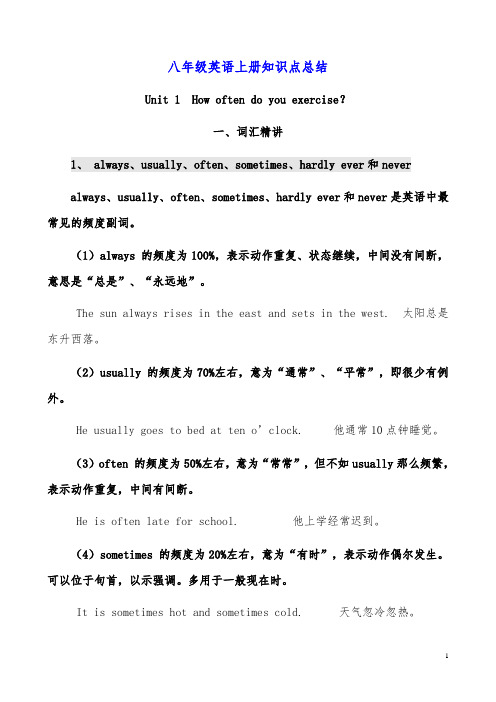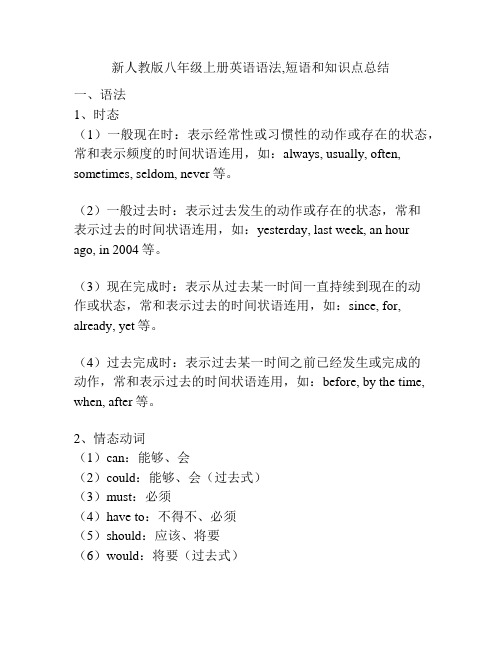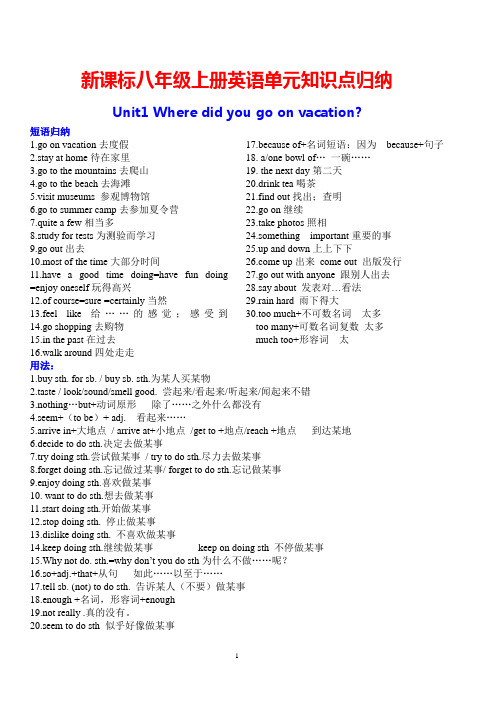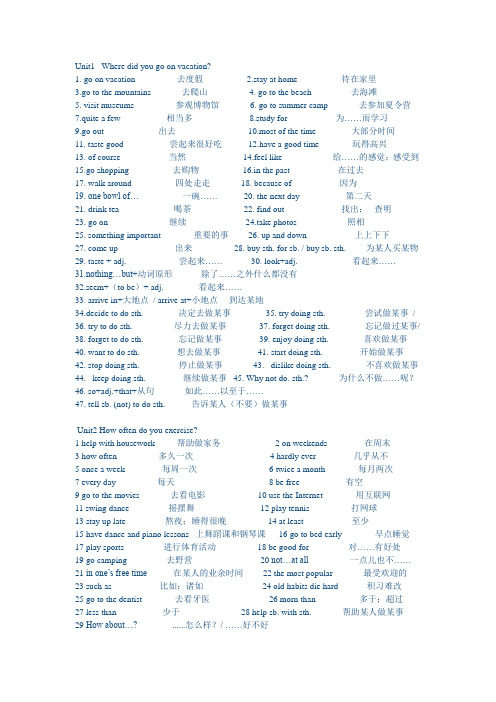新人教版 英语 八年级上 知识点集锦
- 格式:xls
- 大小:105.00 KB
- 文档页数:18

新人教版八年级上册英语知识点总结
本文档总结了新人教版八年级上册英语的重要知识点。
一、基础语法知识
1. 时态和语态:包括一般现在时、一般过去时、一般将来时等常用时态,以及被动语态的构成和用法。
2. 名词:介绍了可数名词和不可数名词的区别,以及名词所有格的构成。
3. 代词:包括主格代词、宾格代词、形容词性物主代词和名词性物主代词的用法。
4. 形容词和副词:介绍了形容词和副词的比较级和最高级的构成规则,以及修饰方式的区别。
5. 介词:包括常用介词的用法和搭配,如in, on, at等。
6. 句子结构:主谓结构、主谓宾结构、并列句和复合句的构成和用法。
二、词汇与阅读技巧
1. 新词汇:列举了本册教材中出现的重要词汇,并给出了中文翻译和例句。
2. 阅读技巧:提供了阅读理解的技巧和方法,如快速阅读、略读和细读等。
三、听力技巧和口语表达
1. 听力技巧:介绍了有效提高听力理解能力的方法,包括听前预测、留意关键词等。
2. 口语表达:列举了常用口语表达,如问路、购物和介绍自己等。
四、写作技巧和语法点
1. 写作技巧:讲解了句子的结构和连接词的使用,以及一些常用写作句型和表达方式。
2. 语法点:解析了本册教材中出现的语法规则和用法,包括动词的时态和语态、名词的所有格等。
该文档总结了新人教版八年级上册英语的重要知识点,希望能对学生们的研究有所帮助。
(800字)。

新人教版八年级上册英语Unit1 Where did you go onvacation知识点大汇总【重点语法】不定代词:不指名代替任何特定名词或形容词的代词叫做不定代词。
用法注意:1. some 和any +可数名/不可数名。
some 多用于肯定句,any多用于否定句、疑问句和条件从句。
有些问句中用some,不用any, 问话者希望得到对方肯定回答。
2. 由some, any, no, every 与body, one, thing构成的复合不定代词作主语时,其谓语动词用三单。
3. 不定代词若有定语修饰,该定语要置于其后:如:something interesting【重点短语】1. buy sth for ab./ buy sb. sth 为某人买某物2. taste + adj. 尝起来……3. nothing...but + V.(原形) 除了……之外什么都没有4. seem + (to be) + adj 看起来5. arrive in + 大地方/ arrive at + 小地方到达某地6. decide to do sth. 决定做某事7. try doing sth. 尝试做某事/ try to do sth. 尽力做某事8. enjoy doing sth. 喜欢做某事9. want to do sth. 想去做某事10. start doing sth. 开始做某事=begin doing sth.11. stop doing sth. 停止做某事区分:stop to do sth. 停下来去做某事12. dislike doing sth. 不喜欢做某事14. so + adj + that + 从句如此……以至于……16. tell sb. (not) to do sth. 告诉某人(不要)做某事17. keep doing sth. 继续做某事18. forget to do sth. 忘记去做某事/ forget doing sth 忘记做过某事【词语辨析】1. take a photo/ take photos 拍照quite a few+名词复数“许多…”2. seem + 形容词看起来…... You seem happy today.seem + to do sth. 似乎/好像做某事I seem to have a coldIt seems + 从句似乎..…. It seems that no one believe you.seem like ... 好像,似乎….. It seems like a good idea.3. arrive in +大地点= get to= reach+地点名“到达......”arrive at +小地点(注:若后跟地点副词here/there/home, 介词需省略,如:arrive here; get home)4. feel like sth 感觉像…feel doing sth. 想要做某事5. wonder(想知道)+疑问词(who, what, why)引导的从句。

人教版八年级上册英语语法、短语和知识点总结归纳一、语法1. 一般现在时- 用法:表示经常性或惯性的动作或状态。
- 结构:主语 + 动词原形 (+ 其他成分)- 示例:I play soccer every weekend.2. 一般过去时- 用法:表示过去某个时间点或一段时间内发生的动作或存在的状态。
- 结构:主语 + 动词过去式 (+ 其他成分)- 示例:She watched a movie last night.3. 现在进行时- 用法:表示现在正在发生的动作。
- 结构:主语 + am/is/are + 动词-ing (+ 其他成分)- 示例:They are studying for the exam.4. 现在完成时- 用法:表示动作或状态发生在过去某个时间点,但与现在有关。
- 结构:主语 + have/has + 动词过去分词 (+ 其他成分)- 示例:I have finished my homework.5. 情态动词- 用法:表示能力、意愿、可能性等。
- 常见的情态动词有 can, could, may, might, must, should, ought to 等。
- 示例:He should go to bed early.二、短语1. as well as- 用法:表示两个事物同时存在或发生。
- 示例:She can speak English as well as Chinese.2. in order to- 用法:为了做某事。
- 示例:They woke up early in order to catch the train.3. by the way- 用法:用于引入一个新的话题或问题。
- 示例:By the way, have you seen the latest movie?三、知识点1. 直接引语和间接引语- 直接引语:用引号括起来的原话。
- 间接引语:将直接引语转述为陈述句或疑问句。

人教版八年级英语上册知识点总结和复习要点一、词汇与短语1重点词汇熟练掌握课本中的新词汇,包括名词、动词、形容词、副词等,并理解其在句子中的用法。
例子:名词:environment(环境)、experience(经历)、relationship(关系)动词:encourage(鼓励)、explain(解释)、expect(期待)形容词:frequent(频繁的)、generous(慷慨的)、responsible(有责任心的)副词:certainly(当然)、fortunately(幸运地)、however (然而)2常用短语记忆并熟练运用课本中的常用短语和固定搭配,提高表达的准确性和流利性。
例子:短语:in the end(最后)、all the time(一直)、as a result (结果)固定搭配:be proud of(以...为傲)、deal with(处理)、pay attention to(注意)二、句型与语法1基本句型熟练掌握五种基本句型,包括主语+谓语、主语+谓语+宾语、主语+谓语+间接宾语+直接宾语、主语+谓语+宾语+宾语补足语、主语+系动词+表语。
例子:主语+谓语:She sings.(她唱歌。
)主语+谓语+宾语:I like apples.(我喜欢苹果。
)主语+谓语+间接宾语+直接宾语:He gave me a book.(他给了我一本书。
)主语+谓语+宾语+宾语补足语:I found the book interesting.(我发现这本书很有趣。
)主语+系动词+表语:She is beautiful.(她很漂亮。
)2时态深入学习并掌握现在完成时、过去进行时、一般将来时、过去将来时等时态的用法和形式。
例子:现在完成时:I have already seen that movie.(我已经看过那部电影了。
)过去进行时:They were playing football when I called them.(我打电话给他们时,他们正在踢足球。

八年级英语上册知识点总结Unit 1 How often do you exercise?一、词汇精讲1、 always、usually、often、sometimes、hardly ever和neveralways、usually、often、sometimes、hardly ever和never是英语中最常见的频度副词。
(1)always 的频度为100%,表示动作重复、状态继续,中间没有间断,意思是“总是”、“永远地”。
The sun always rises in the east and sets in the west. 太阳总是东升西落。
(2)usually 的频度为70%左右,意为“通常”、“平常”,即很少有例外。
He usually goes to bed at ten o’clock. 他通常10点钟睡觉。
(3)often 的频度为50%左右,意为“常常”,但不如usually那么频繁,表示动作重复,中间有间断。
He is often late for school. 他上学经常迟到。
(4)sometimes 的频度为20%左右,意为“有时”,表示动作偶尔发生。
可以位于句首,以示强调。
多用于一般现在时。
It is sometimes hot and sometimes cold. 天气忽冷忽热。
Sometimes he does it this way and sometimes he does it that way.他有时这样做,有时那样做。
(5)hardly ever 的频度为5%左右,意为“几乎不”、“偶尔”,表频率,位置是“行前be后”。
I hardly ever go out these days. 这些天我几乎不出门。
(6)never 的频度为0,意为“从来不”、“永不”。
My parents are never late for work. 我父母上班从来不迟到。


人教版八年级英语上册知识点总结(全)Unit 1 How often do you exercise?一、词汇精讲1、 always、usually、often、sometimes、hardly ever和neveralways、usually、often、sometimes、hardly ever和never是英语中最常见的频度副词。
(1)always的频度为100%;表示动作重复、状态继续;中间没有间断;意思是“总是”、“永远地”。
The sun always rises in the east and sets in the west. 太阳总是东升西落。
(2)usually 的频度为70%左右;意为“通常”、“平常”;即很少有例外。
He usually goes to bed at ten o’clock. 他通常10点钟睡觉。
(3)often的频度为50%左右;意为“常常”;但不如usually那么频繁;表示动作重复;中间有间断。
He is often late for school. 他上学经常迟到。
(4)sometimes的频度为20%左右;意为“有时”;表示动作偶尔发生。
可以位于句首;以示强调。
多用于一般现在时。
It is sometimes hot and sometimes cold. 天气忽冷忽热。
Sometimes he does it this way and sometimes he does it that way.他有时这样做;有时那样做。
(5)hardly ever 的频度为5%左右;意为“几乎不”、“偶尔”;表频率;位置是“行前be后”。
I hardly ever go out these days. 这些天我几乎不出门。
(6)never 的频度为0;意为“从来不”、“永不”。
My parents are never late for work. 我父母上班从来不迟到。

人教版八年级英语上册短语语法知识点总结初二英语课组2019年[由我校初二英语科组根据最新考纲和近几年中考的趋势加上我校学生的实际情况,结合初二全体英语科组的力量,汇编了这一份重点总结,编好一份学案不易,望同学们能好好利用。
]Unit 1 Where did you go on vacation一、必背单词短语。
Section A1.Where did you go on vacation? (P. 1)on vacation意为“在度假”,结构“on+名词”表示“在某种状态中”。
例句:My family went to Hainan on vacation last year.2....visited my uncle (P. 1)visit此处用作及物动词,后接人或物做宾语,意为“拜访、看望”,后接表示地点的名词,意为“参观、游览”。
例句:I visited my grandmother last week.例句:Do you want to visit Shanghai?3....go with anyone? (P. 2)(1)anyone用作不定代词,意为“有人、任何人”,相当于anybody,用于疑问句和否定句中,在肯定句中用someone或者somebody。
但是anyone也可以用在肯定句中,表示“任何一个人”。
例句:Did you meet anyone friendly in that city?例句:Anyone can be helpful in some way.(2)anyone只能指人,不可以指物,后面不接of短语;any one既可以指人也可以指物,后可接of短语。
例句:You can ask any one of us about this question.4....buy anything special? (P. 2)(1)buy用作双宾语动词,表示“买”,常用的结构为“buy sb. sth.”或者“buy sth. for sb.”,表示“为某人买某物”。

最新人教版八年级上册英语知识点总结成为英语小能手快速提高听说读写能力最新人教版八年级上册英语知识点总结英语是一门世界通用的语言,对于学习者而言,掌握好英语是非常重要的。
本文将为大家总结人教版八年级上册英语的知识点,帮助大家快速提高听说读写能力。
一、语法知识1. 一般现在时(Simple Present Tense):用于描述经常性的动作或客观事实。
例句:I often go to school by bus.2. 一般过去时(Simple Past Tense):用于描述过去发生的动作或状态。
例句:She watched a movie last night.3. 一般将来时(Simple Future Tense):用于表示将来要发生的动作或情况。
例句:I will visit my grandparents next week.4. 现在进行时(Present Continuous Tense):用于表示现在正在进行的动作。
例句:They are playing football in the park.5. 现在完成时(Present Perfect Tense):用于表示过去发生但与现在有关的动作。
例句:We have lived here for five years.6. 情态动词(Modal Verbs):用于表示能力、允许、必须、愿意等情态。
例句:You should finish your homework on time.7. 被动语态(Passive Voice):用于强调动作的承受者而不是执行者。
例句:The book was written by a famous author.二、词汇积累1. 常用动词(Verbs):如read、write、speak等。
2. 日常生活词汇(Daily Life Vocabulary):如food、clothes、weather等。
3. 时间词汇(Time Vocabulary):如Monday、morning、year 等。

人教版八上英语知识点人教版八年级上册英语知识点概述一、词汇与短语1. 基础词汇- 家庭成员:mother, father, sister, brother, grandfather, grandmother, etc.- 学校科目:math, English, Chinese, physics, history, etc. - 日常活动:get up, go to school, havebreakfast/lunch/dinner, do homework, etc.- 常见食物:apple, banana, chicken, rice, noodles, etc.- 动物与宠物:dog, cat, fish, bird, etc.2. 短语- 问路:Excuse me, where is the...?- 购物:Can I help you? How much is it?- 餐馆用语:A table for two, please. I'd like some...- 学校用语:Let's begin. Take notes. Pay attention, please.二、语法点1. 一般现在时- 表示经常性或习惯性的动作。
- 动词第三人称单数的变化规则。
2. 一般过去时- 表示过去某一确定时间发生的动作或状态。
- 规则动词和不规则动词的过去式。
3. 现在进行时- 表示正在进行的动作。
- 构成:am/is/are + V-ing。
4. 可数名词与不可数名词- 可数名词的单复数形式。
- 不可数名词的量化表达。
5. 代词- 主格和宾格代词。
- 形容词性物主代词和名词性物主代词。
6. 简单句与并列句- 简单句的基本结构。
- 并列句的连接词:and, but, or, so 等。
三、阅读理解1. 阅读技巧- 快速浏览(Skimming)和详细阅读(Scanning)。
- 根据上下文推断生词的意思。

人教版新目标八年级上册英语知识点全册一、Unit 1本单元主要学习了介绍自己和他人的基本信息、询问和回答年龄以及表达喜欢和不喜欢的事物。
以下是本单元的主要知识点:1. 介绍自己和他人- 表达自己的姓名:My name is...- 询问对方的姓名:What's your name?- 回答对方的姓名:My name is...- 询问对方的国籍:Where are you from?- 回答对方的国籍:I'm from...- 询问对方的年龄:How old are you?- 回答对方的年龄:I'm...years old.2. 表达年龄- 数字1-100的表达法:one, two, three, four, five, six, seven, eight, nine, ten, eleven, twelve, thirteen, fourteen, fifteen, sixteen, seventeen, eighteen, nineteen, twenty, thirty, forty, fifty, sixty, seventy, eighty, ninety, one hundred.- 询问某人的年龄:How old are you?- 回答某人的年龄:I'm...years old.3. 表达喜好和不喜好- 喜欢某物:like- 不喜欢某物:don't like- 例句:I like playing basketball. / He doesn't like swimming.二、Unit 2本单元主要学习了询问和指示方向的表达方式,以及介绍某地的位置。
以下是本单元的主要知识点:1. 询问和指示方向- 询问某地的位置:Where is...?- 表示某地的位置:It's...- 例句:Where is the library? It's next to the school.2. 介绍某地的位置- 表示在某地的具体位置:on, in, under, next to, between, behind, in front of.- 例句:The supermarket is next to the bank. / The school is between the hospital and the post office.三、Unit 3本单元主要学习了购物和描述物品的基本词汇和句型。

新人教版初中英语八年级上册知识点总结重点单词- analyze 分析- colleague 同事- destination 目的地- exaggerate 夸大- fundamental 基础的- integrate 整合- navigate 导航- numerous 许多的- prominent 突出的重点短语- be aware of 意识到- be responsible for 对...负责- go through 经历- make a difference 有影响- pick up 拾起- put forward 提出- take advantage of 利用重点语法时态- 现在时:表示现在正在进行或经常进行的动作。
- e.g. I am studying English.- 过去时:表示过去某个时间正在进行的动作或已经结束的动作。
- e.g. He watched TV yesterday afternoon.- 将来时:表示将来要进行或发生的动作。
- e.g. We will have a meeting tomorrow.疑问句- 一般疑问句:在句首加助动词 do/does/did。
- e.g. Do you like pizza?- 特殊疑问句:用特定的疑问代词(what, where, when, why,how等)引导。
- e.g. What did you do last night?名词所有格- 一般来说,名词后加’s。
- e.g. The doctor’s office重点句型- It’s important to do sth. 做某事很重要。
- Whether you like it or not, you have to do it. 不管你喜欢不喜欢,你都得做。
- The more…, the more… 越……就越……。
- I’m looking forward to doing sth. 我期待着做某事。

新人教版八年级上册英语单元语法及知识点概述本文档概述了新人教版八年级上册英语教材中各个单元的语法和知识点。
Unit 1: My New Teachers- 介绍人物时使用第三人称单数形式的动词- 询问对某人的印象时使用What do you think of...?- 表示喜欢或不喜欢某物时使用like和dislikeUnit 2: I used to be afraid of the dark- used to表示过去的惯或经历- 表示过去的状况时使用was/wereUnit 3: I feel sad- 表示情感和感受时使用feel- 使用be动词+形容词表达情感状态- 表示总是或经常做某事时使用always或often Unit 4: What's the best movie theater?- 比较级和最高级的用法- 询问建议时使用What do you suggest?- 表示原因时使用becauseUnit 5: It must belong to Carla- 表示推测或某事是肯定的时使用must- 表示推测或某事是可能的时使用might- 表示推测或某事是否定的时使用can'tUnit 6: I like music that I can dance to- 表示喜欢某种中性事物时使用like- 表示喜欢可以+动词原形的事物- 表示不喜欢不可以+动词原形的事物Unit 7: Teenagers should be allowed to choose their own clothes- 表示应该或不应该做某事时使用should or shouldn't- 表示能够或不允许做某事时使用can or can't- 使用be动词+动词不定式表示被允许或不被允许做某事Unit 8: Home alone- 表示需要或必需做某事时使用have to- 表示过去需要或必需做某事时使用had to- 表示建议或推荐时使用should或had betterUnit 9: When was it invented?- 使用一般过去时表示过去的经历或事件- 使用一般过去时的疑问句形式提问过去的经历或事件- 使用介词短语表示一段时间以上是新人教版八年级上册英语教材中各单元的语法和知识点概述。

新人教版八年级上册英语语法,短语和知识点总结一、语法1、时态(1)一般现在时:表示经常性或习惯性的动作或存在的状态,常和表示频度的时间状语连用,如:always, usually, often, sometimes, seldom, never等。
(2)一般过去时:表示过去发生的动作或存在的状态,常和表示过去的时间状语连用,如:yesterday, last week, an hour ago, in 2004等。
(3)现在完成时:表示从过去某一时间一直持续到现在的动作或状态,常和表示过去的时间状语连用,如:since, for, already, yet等。
(4)过去完成时:表示过去某一时间之前已经发生或完成的动作,常和表示过去的时间状语连用,如:before, by the time, when, after等。
2、情态动词(1)can:能够、会(2)could:能够、会(过去式)(3)must:必须(4)have to:不得不、必须(5)should:应该、将要(6)would:将要(过去式)3、虚拟语气(1)一般现在时:主语+should/were to +动词原形+其他(2)一般过去时:主语+should/were to have +过去分词+其他二、短语1、make a difference:有影响,有区别2、at once:立即,马上3、take care of:照顾,照料4、in the end:最后,终于5、be good at:擅长于6、as well as:也,又7、keep healthy:保持健康8、come true:实现,成真三、知识点一般现在时:表示经常性或习惯性的动作或存在的状态,常和表示频度的时间状语连用,如:always, usually, often, sometimes, seldom, never等。

新课标八年级上册英语单元知识点归纳Unit1 Where did you go on vacation?短语归纳1.go on vacation去度假2.stay at home待在家里3.go to the mountains去爬山4.go to the beach去海滩5.visit museums 参观博物馆6.go to summer camp去参加夏令营7.quite a few相当多8.study for tests为测验而学习9.go out出去10.most of the time大部分时间11.have a good time doing=have fun doing =enjoy oneself玩得高兴12.of course=sure =certainly当然13.feel like给……的感觉;感受到14.go shopping去购物15.in the past在过去16.walk around四处走走17.because of+名词短语:因为because+句子18. a/one bowl of…一碗……19. the next day第二天20.drink tea喝茶21.find out找出;查明22.go on继续23.take photos照相24.something important重要的事25.up and down上上下下e up出来come out 出版发行27.go out with anyone 跟别人出去28.say about 发表对…看法29.rain hard 雨下得大30.too much+不可数名词太多too many+可数名词复数太多much too+形容词太用法:1.buy sth. for sb. / buy sb. sth.为某人买某物2.taste / look/sound/smell good. 尝起来/看起来/听起来/闻起来不错3.nothing…but+动词原形除了……之外什么都没有4.seem+(to be)+ adj. 看起来……5.arrive in+大地点/ arrive at+小地点/get to +地点/reach +地点到达某地6.decide to do sth.决定去做某事7.try doing sth.尝试做某事/ try to do sth.尽力去做某事8.forget doing sth.忘记做过某事/ forget to do sth.忘记做某事9.enjoy doing sth.喜欢做某事10. want to do sth.想去做某事11.start doing sth.开始做某事12.stop doing sth. 停止做某事13.dislike doing sth. 不喜欢做某事14.keep doing sth.继续做某事keep on doing sth 不停做某事15.Why not do. sth.=why don’t you do sth为什么不做……呢?16.so+adj.+that+从句如此……以至于……17.tell sb. (not) to do sth. 告诉某人(不要)做某事18.enough +名词,形容词+enough19.not really .真的没有。

Unit1 Where did you go on vacation?1. go on vacation 去度假2.stay at home 待在家里3.go to the mountains 去爬山4. go to the beach 去海滩5. visit museums 参观博物馆6. go to summer camp 去参加夏令营7.quite a few 相当多8.study for 为……而学习9.go out 出去10.most of the time 大部分时间11. taste good 尝起来很好吃12.have a good time 玩得高兴13. of course 当然14.feel like 给……的感觉;感受到15.go shopping 去购物16.in the past 在过去17. walk around 四处走走18. because of 因为19. one bowl of…一碗……20. the next day 第二天21. drink tea 喝茶22. find out 找出;查明23. go on 继续24.take photos 照相25. something important 重要的事26. up and down 上上下下27. come up 出来28. buy sth. for sb. / buy sb. sth. 为某人买某物29. taste + adj. 尝起来……30. look+adj. 看起来……31.nothing…but+动词原形除了……之外什么都没有32.seem+(to be)+ adj. 看起来……33. arrive in+大地点/ arrive at+小地点到达某地34.decide to do sth. 决定去做某事35. try doing sth. 尝试做某事/ 36. try to do sth. 尽力去做某事37. forget doing sth. 忘记做过某事/ 38. forget to do sth. 忘记做某事39. enjoy doing sth. 喜欢做某事40. want to do sth. 想去做某事41. start doing sth. 开始做某事42. stop doing sth. 停止做某事43. dislike doing sth. 不喜欢做某事44. keep doing sth. 继续做某事45. Why not do. sth.? 为什么不做……呢?46. so+adj.+that+从句如此……以至于……47. tell sb. (not) to do sth. 告诉某人(不要)做某事Unit2 How often do you exercise?1 help with housework 帮助做家务2 on weekends 在周末3 how often 多久一次4 hardly ever 几乎从不5 once a week 每周一次6 twice a month 每月两次7 every day 每天8 be free 有空9 go to the movies 去看电影10 use the Internet 用互联网11 swing dance 摇摆舞12 play tennis 打网球13 stay up late 熬夜;睡得很晚14 at least 至少15 have dance and piano lessons 上舞蹈课和钢琴课16 go to bed early 早点睡觉17 play sports 进行体育活动18 be good for 对……有好处19 go camping 去野营20 not…at all一点儿也不……21 in one’s free time在某人的业余时间22 the most popular 最受欢迎的23 such as 比如;诸如24 old habits die hard 积习难改25 go to the dentist 去看牙医26 morn than 多于;超过27 less than 少于28 help sb. with sth. 帮助某人做某事29 How about…?......怎么样?/ ……好不好30 want sb. to do sth. 想让某人做某事31 How many+可数名词复数+一般疑问句?……有多少……?32 主语+find+that从句. ……发现……33 spend time with sb. 和某人一起度过时光34 It’s+ adj.+ to do sth.做某事的……的。

新人教版八年级上册英语单元语法及知识点归纳Unit1 Where did you go on vacation?【重点语法】不定代词:不指名代替任何特定名词或形容词的代词叫做不定代词。
用法注意:1. some 和any +可数名/不可数名。
some 多用于肯定句,any多用于否定句、疑问句和条件从句。
有些问句中用some,不用any, 问话者希望得到对方肯定回答。
2. 由some, any, no, every 与body, one, thing构成的复合不定代词作主语时,其谓语动词用三单。
3. 不定代词若有定语修饰,该定语要置于其后:如:something interesting【重点短语】1. buy sth for ab./ buy sb. sth 为某人买某物2. taste + adj. 尝起来……3. nothing...but + V.(原形) 除了……之外什么都没有4. seem + (to be) + adj 看起来5. arrive in + 大地方/ arrive at + 小地方到达某地6. decide to do sth. 决定做某事7. try doing sth. 尝试做某事/ try to do sth. 尽力做某事8. enjoy doing sth. 喜欢做某事9. want to do sth. 想去做某事10. start doing sth. 开始做某事=begin doing sth.11. stop doing sth. 停止做某事区分:stop to do sth. 停下来去做某事12. dislike doing sth. 不喜欢做某事14. so + adj + that + 从句如此……以至于……16. tell sb. (not) to do sth. 告诉某人(不要)做某事17. keep doing sth. 继续做某事18. forget to do sth. 忘记去做某事/ forget doing sth 忘记做过某事【词语辨析】1. take a photo/ take photos 拍照quite a few+名词复数“许多…”2. seem + 形容词看起来…... You seem happy today.seem + to do sth. 似乎/好像做某事I seem to have a coldIt seems + 从句似乎..…. It seems that no one believe you.seem like ... 好像,似乎….. It seems like a good idea.3. arrive in +大地点= get to= reach+地点名“到达......”arrive at +小地点(注:若后跟地点副词here/there/home, 介词需省略,如:arrive here; get home)4. feel like sth 感觉像…feel doing sth. 想要做某事5. wonder(想知道)+疑问词(who, what, why)引导的从句。